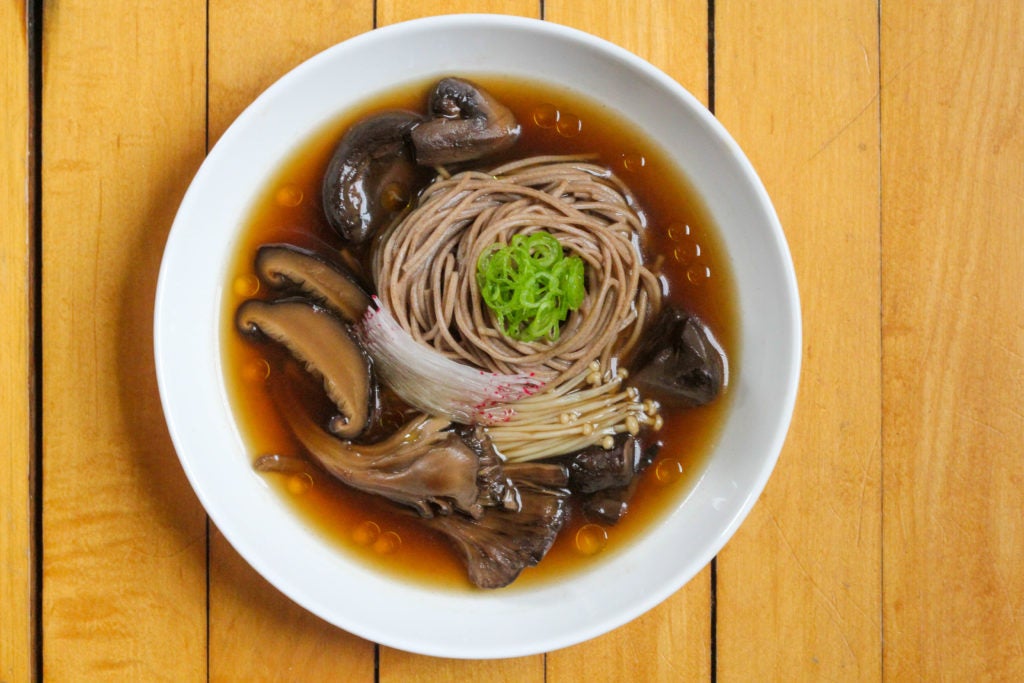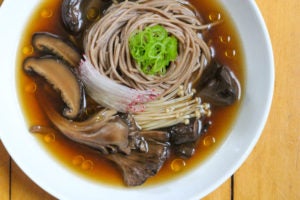
Mushrooms are packed with flavor. Specifically, that savory, umami flavor comes from a naturally high concentration of glutamic acid. Glutamic acid is an amino acid that’s essential to many natural chemical processes. Dissolved in water, glutamic acid separates into ions, of which the negatively charged glutamates are the real heavy-hitters. When we bite into a piece of parmesan or sip on a steamy cup of miso soup, those glutamates—along with other molecules—are delivering an intensely savory sensation, which we perceive as umami and delicious. But if we bite into a raw mushroom, it doesn’t really taste all that savory.
So how do we bring out the flavor and maximize umami? One way is to use a pressure cooker. Increased temperature and pressure caramelizes and breaks down mushrooms quickly, freeing up glutamates and resulting in a more flavorful base. Here we make a quick soup by first browning the mushrooms to build flavor. Soy sauce and wine add extra sweetness and savoriness. After pressure cooking, we even double down on umami, steeping sheets of glutamate-rich kombu in our finished stock. The finished soup is rich, meaty, and intensely savory. And the best part? The cooked mushrooms still have plenty of flavor and a pleasing, tender texture. We serve this soup simply, with soba and the leftover mushrooms—as well as some fresh ones. But feel free to mix it up with this one. This recipe works best with a mix of mushrooms (cremini, button, shiitake, hen of the woods, chanterelles), but it’s still great if you’re on a budget and only have buttons or creminis on hand.
Wild Mushroom Soup with Soba

- Soup
- 10 ounces mushrooms, cut into 1-inch pieces
- ¼ cup plus 2 quarts water, divided
- ¼ teaspoon salt
- 2 tablespoons vegetable oil
- 1 clove chopped garlic
- 2 tablespoons dry white wine or dry vermouth
- 2 tablespoons reduced-sodium soy sauce
- 1 ounce dried shiitakes
- 1 teaspoon black peppercorns
-
1 ounce kombu, broken into 4 pieces
-
Noodles
- 8 ounces soba noodles
- 2 ounces enoki mushrooms, trimmed
- 2 scallions, sliced thin
- 4 radishes, sliced thin
- Sesame oil for serving, optional
- For the Soup: Stir mushrooms, 1/4 cup water, and salt in pressure-cooker pot. Cook over high heat, stirring occasionally, until water has evaporated and mushrooms release moisture, 8 to 12 minutes. Reduce heat to medium, add oil and cook, stirring occasionally, until mushrooms are well browned, 4 to 6 minutes longer. Stir in garlic and cook until fragrant, about 30 seconds. Stir in wine and soy sauce, scraping up any browned bits, and cook until wine has evaporated, about 1 minute.
- Stir in remaining 2 quarts water and peppercorns, lock pressure-cooker lid in place and bring to high pressure over high heat. As soon as pot reaches high pressure, reduce heat to medium-low and cook for 30 minutes, adjusting heat as needed to maintain high pressure.
- Remove pot from heat and let pressure release naturally for 15 minutes. Quick release any remaining pressure, then carefully remove lid, allowing steam to escape away from you. Return soup to simmer over low heat, stir in kombu, and cook until kombu has softened and doubled in size, about 10 minutes. Strain soup through fine mesh strainer set over bowl, pushing on solids to extract as much liquid as possible. Reserve mushrooms in bowl, discarding kombu and peppercorns (Cooked peppercorns have a soft, berry-like texture. Leave them in if desired).
- For the Noodles: Bring 2 quarts water to boil in medium pot. Add soba and cook, stirring occasionally, until just al dente, about 5 minutes. Strain soba in fine mesh strainer and divide between bowls.
- Meanwhile, bring mushroom soup, cooked mushrooms, and enoki mushrooms to simmer in now-empty pressure-cooker pot over medium-low heat. Divide soup and mushrooms between bowls. Add radishes and scallions and serve, drizzling with sesame oil if desired.

